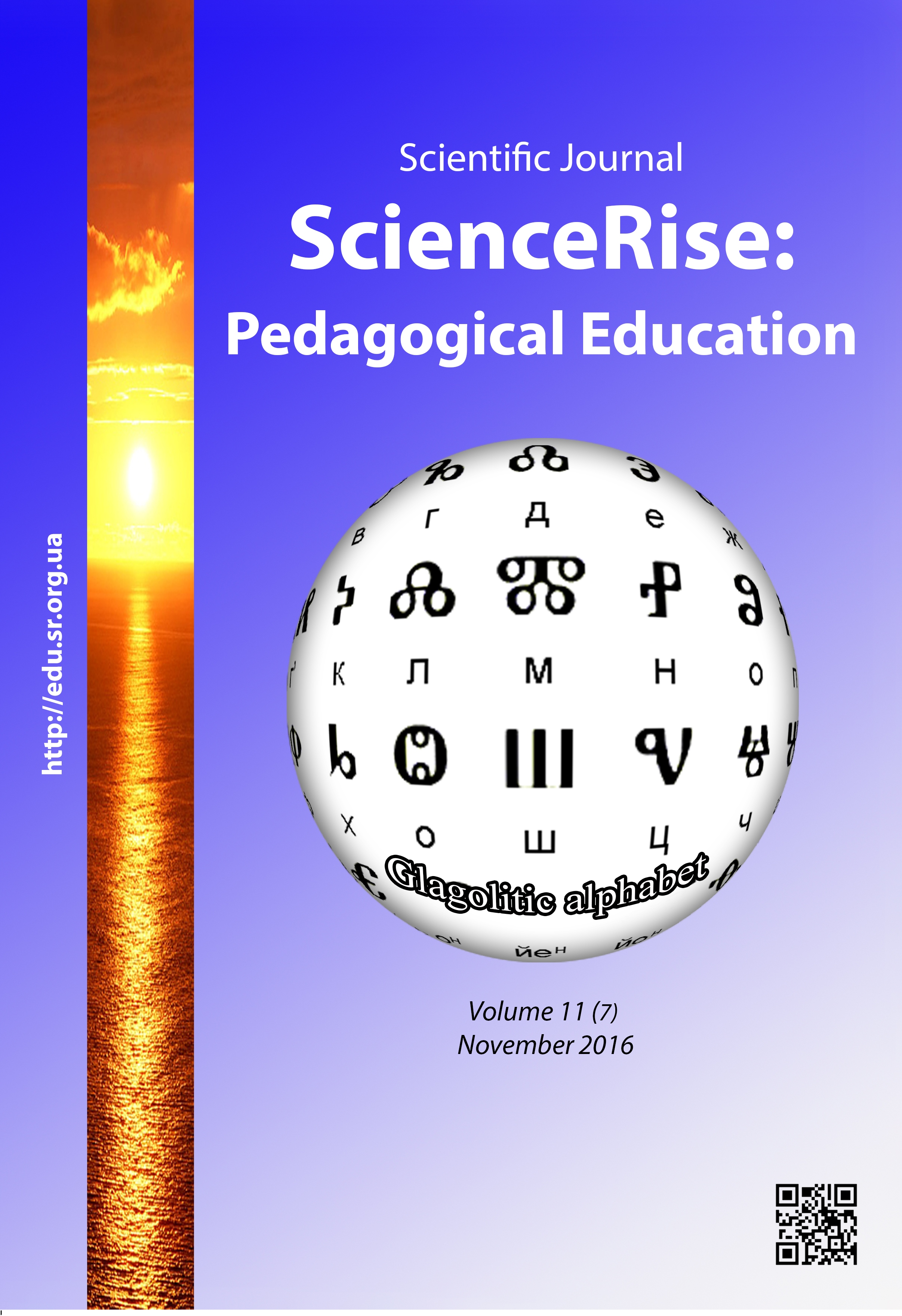Justification of the essence of creativity in the content of the training of the modern teacher
DOI:
https://doi.org/10.15587/2519-4984.2016.83483Keywords:
modern teacher, creativity, pedagogical creativity, content of training, creative pedagogical workshopAbstract
Taking into account the needs of the modern society, the question of reorientation of the higher pedagogical education to the training of the specialist of the new type, highly qualified, with creative thinking, non-standard approach to the solution of professional tasks becomes topical. In the article the author sets the aim to elucidate the essence of the phenomenon of “creativity” and to ground its role in the training of the modern teacher. By the way of phenomenological analysis of philosophical, psychological and pedagogical sources it was determined, that a human states itself in creativity, develops and creates him- (her) self as a person. It was determined, that creativity is the necessary component of pedagogical activity, in which process the teacher’s creative person is formed. The most important features of such teacher is the searching-problem style of thinking, problem understanding, developed creative imagination, fantasy, specific personal qualities (keenness, independence, purposefulness) and also the main specific motives (creative interest, enthusiasm to creative process, striving for attaining result, necessity to realize him- (her) self). It was established, that the effectiveness of the training of the modern teacher with the features of creative persons becomes possible under condition of the inclusion of creative component into the process of their training. The value of creative pedagogical workshops that are the important base of the training of the teacher of new type, with creative thinking, non-standard approach to the solution of professional tasks was discovered. The author proves that the social mission of activity of the higher pedagogical educational institutions must be not only the training of teachers to the realization of professional tasks and functions, outlined by educational-qualified characteristic but also the formation of creative person of the teacher, able to generate new knowledge, to be the unique source of productive social activity
References
- Gegel, V. F. (1973). Estetika [Аesthetic]. Vol. 4. Moscow: Iskusstvo, 546.
- Kant, I. (1966). Sochineniya [Works]. Vol. 5. Moscow: Mysl, 564.
- Andrushenko, Y. V. (2006). Filosofskiy slovar [Philosophical dictionary]. Kyiv: A.S.K., 1056.
- Shinkaruk, V. I. (Ed.) (2002). Filosofskiy entsiklopedichniy slovnik [Philosophical encyclopedic dictionary]. Kyiv: Abris, 742.
- Romenets, V. A. (2004). Psihologiya tvorchosti [The psychology of creativity]. Kyiv: Libid, 286.
- Stepanov, O. M. (2006). Psihologichna encyklopediya [Psychological encyclopedia]. Kyiv: Akademvydav, 424.
- Turinina, O. L. (2007). Psihologiya tvorchosti [The psychology of creativity]. Kyiv: MAUP, 160.
- Dubasenyuk, O. A. (Ed.) (2012). Teoretichn i i prikladn i aspekti rozvitku kreativno i osv iti u vishch ij shkol i [Theoretical and applied aspects of development of creative education in the higher school]. Zhitomir: ZHDU im. I. Franka, 284.
- Zyazyun, I. A. (2008). Filosofiya pedagogichnoyi diyi [The philosophy of pedagogical action]. Cherkasi: ChNU im. B.Hmelnitskogo, 608.
- Kabalevskyi, D. B. (1984). Vospytanye uma y serdtsa [Education of mind and heart]. Moscow: Prosveshchenye, 206.
- Kapterev, P. F.; Arsenyeva, A. M. (Ed.) (1982). Yzbrann ie pedahohycheskye sochynenyia [Selected pedagogical works]. Moscow: Pedahohyka, 704.
- Kan-Kalyk, V. A. (1977). Pedahohycheskaia deiatelnost kak tvorcheskyi protsess [Pedagogical activity as a creative process]. Moscow: NIIVSH, 64.
- Savenkov, A. Y. (2004). Put k odarёnnosty: yssledovatelskoe povedenye doshkolnykov [The path of giftedness: research the behavior of preschoolers]. Saint Petersburg: PYTER, 272.
- Sysoieva, S. O. (1994). Osnovy pedahohichnoi tvorchosti vchytelia [Basics of pedagogical creativity of the teacher]. Kyiv: ISDOU, 112.
- Konovets, S. V. (2009). Tvorchyi rozvytok uchytelia obrazotvorchoho mystetstva [Creative development teacher of visual art]. Rivne: Volynski oberehy, 384.
- Mukhyna, Y. A. (2002). Chto takoe pedahohycheskaia masterskaia? [What is a teacher's workshop?]. Masterskye po lyterature: yntehratsyia ynnovatsyonnoho y tradytsyonnoho op ita [Workshops for literature: integration of innovative and traditional experience]. Saint Petersburg, 209.
Downloads
Published
How to Cite
Issue
Section
License
Copyright (c) 2016 Галина Іванівна Сотська

This work is licensed under a Creative Commons Attribution 4.0 International License.
Our journal abides by the Creative Commons CC BY copyright rights and permissions for open access journals.
Authors, who are published in this journal, agree to the following conditions:
1. The authors reserve the right to authorship of the work and pass the first publication right of this work to the journal under the terms of a Creative Commons CC BY, which allows others to freely distribute the published research with the obligatory reference to the authors of the original work and the first publication of the work in this journal.
2. The authors have the right to conclude separate supplement agreements that relate to non-exclusive work distribution in the form in which it has been published by the journal (for example, to upload the work to the online storage of the journal or publish it as part of a monograph), provided that the reference to the first publication of the work in this journal is included.








